
Reconnecting with Your Inner Child: A Deep Dive into Transformative Healing
The inner child is more than a metaphor—it’s a vital part of the healing journey. Explore how reconnecting with your inner child helps unravel emotional wounds, release survival patterns, and create lasting change from the inside out.
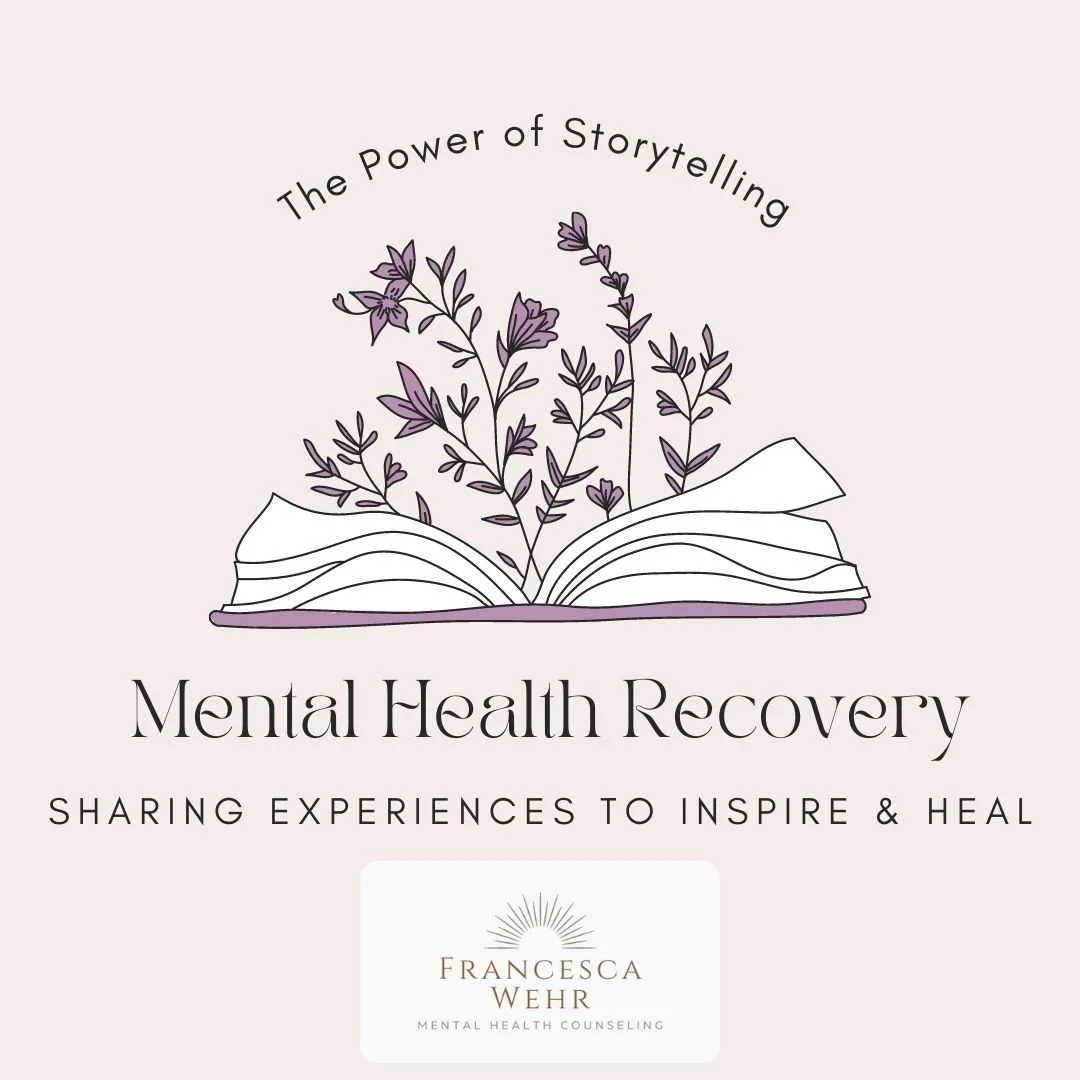
The Power of Storytelling in Mental Health Recovery: Sharing Experiences to Inspire and Heal
Storytelling has been an essential part of human culture for thousands of years, serving as a means of communication, education, and entertainment. In the context of mental health recovery, storytelling can also be a powerful tool for healing and inspiration. By sharing our experiences and listening to others, we can find strength, hope, and a sense of connection. Pathways to Wellness: Insights from Francesca Wehr, LCSW Mental Health Counseling discusses the importance of storytelling in mental health recovery and shares inspiring stories of individuals who have overcome emotional challenges through sharing their experiences.

Understanding the Tapestry of Trauma Responses: A Deeper Dive
Trauma isn’t just about what happened—it’s about how your nervous system responded to a rupture in safety, trust, or connection. Many behaviors that seem confusing, frustrating, or even self-sabotaging are actually profound adaptations to distress. From emotional numbing to hypervigilance, people-pleasing to risk-taking, this article explores the nuanced spectrum of trauma responses and offers a compassionate reframing of these patterns. When we understand them as survival strategies—not flaws—we open the door to healing, self-trust, and deeper connection.

The CDC-Kaiser Permanente Adverse Childhood Experiences (ACE) Study: Unraveling the Personal Impact on Adult Lives
The Adverse Childhood Experiences (ACE) Study, conducted by the CDC and Kaiser Permanente, has revolutionized how we understand the lifelong effects of childhood trauma. This landmark research shows how early adversities—like abuse and neglect—can lead to chronic health conditions, mental health struggles, and social challenges in adulthood. Dive into the study’s findings, the far-reaching impact of ACEs, and how trauma-informed care and early intervention are critical for breaking the cycle of trauma across generations.

5 Signs Your Relationship Needs a Communication Tune-Up
Effective communication is the foundation of any healthy relationship, but even the best couples can experience breakdowns. If misunderstandings are frequent or tough conversations are being avoided, it might be time for a communication tune-up. In this post, we’ll cover five key signs that your relationship could benefit from better communication and offer actionable tips to help you reconnect with your partner.

How Trauma Impacts the Body: An In-Depth Exploration of Mind-Body Healing
Trauma affects more than just the mind—it leaves a lasting imprint on the body. Dr. Bessel van der Kolk’s concept, “The Body Keeps the Score,” reveals how trauma is stored within our physiology, often manifesting as chronic pain, fatigue, and other health issues. By exploring the powerful connection between mind and body, and through integrative approaches like somatic therapy, individuals can begin to heal from trauma in a truly holistic way. Discover how addressing both mental and physical aspects of trauma can lead to lasting wellness and resilience.

The Connection Between Mental Health and Physical Health: A Holistic Approach to Well-Being
The connection between mental health and physical health is often overlooked, yet it is crucial for overall well-being. A holistic approach to health acknowledges the intricate relationship between the mind and the body, recognizing that both aspects must be considered for optimal health. Pathways to Wellness: Insights from Francesca Wehr, LCSW Mental Health Counseling, and Connect H&W explores this connection and provides strategies for promoting a balanced, holistic approach to well-being. This collaboration highlights the benefits of integrating physical therapy, somatic breath work, and EMDR for comprehensive healing.

Healing from Emotional Abuse and the Maze of Reenactment
Join Francesca Wehr, LCSW, as she guides us through the complex journey of healing from emotional abuse. This insightful post delves into the phenomena of trauma reenactment and revictimization, shedding light on the subconscious patterns that perpetuate past traumas into present scenarios. Learn about the psychological underpinnings of trauma, effective coping mechanisms, and therapeutic strategies that aim to break the cycle of abuse and empower individuals towards a resilient and renewed self.
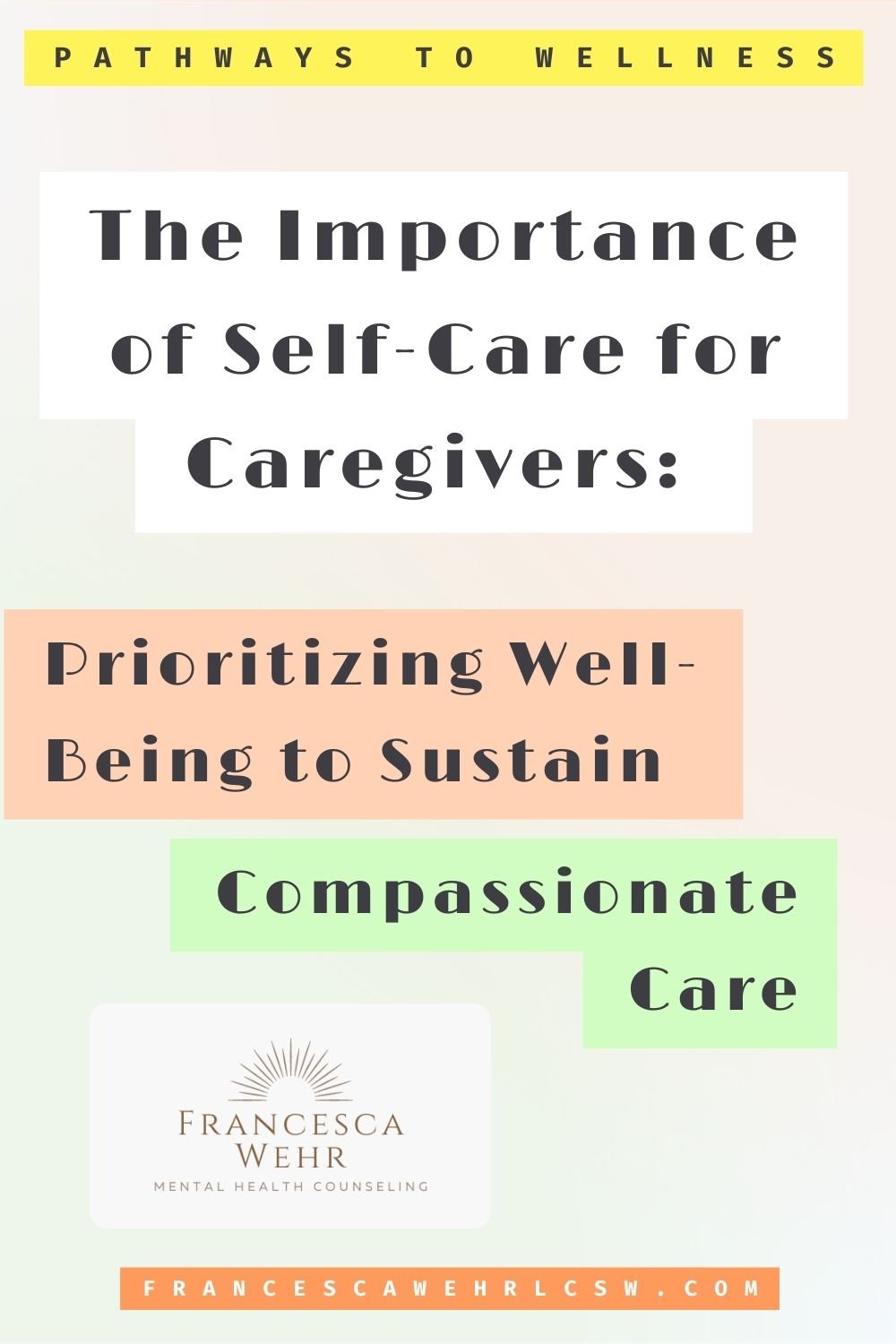
The Importance of Self-Care for Caregivers: Prioritizing Well-Being to Sustain Compassionate Care
Caregivers, whether professional or personal, play a vital role in supporting the well-being of others. However, the demanding nature of caregiving can take a toll on one's physical, emotional, and mental health. Self-care is essential for caregivers to maintain their own well-being and continue providing compassionate care for others. Pathways to Wellness: Insights from Francesca Wehr, LCSW Mental Health Counseling discusses the importance of self-care for caregivers and provides practical tips to incorporate self-care into daily routines.

From Survival to Healing: Navigating Post-Traumatic Stress and Finding Resolution
The last part of the “From Surviving to Healing” Trauma series, this blog post navigates the complex journey from survival to healing. This requires more than just revisiting traumatic memories; it demands a reconnection to the present and a reclamation of one's sense of safety and self. For many trauma survivors, the past feels unsettlingly close, a series of vivid flashbacks and heightened states that blur the lines between then and now. The challenge is not merely to recount the trauma but to feel, deep in one's bones, that it has passed and that safety has been restored.
Healing involves a delicate balance of acknowledging the trauma while firmly rooting oneself in the present, employing strategies to calm the nervous system, and recognizing triggers without being overwhelmed by them. Techniques like mindfulness, somatic therapies, and EMDR offer pathways to process traumatic memories in a way that diminishes their power, allowing survivors to redefine their narratives on their own terms. This transformative process paves the way for a life where trauma informs but does not control, where past pain leads to present resilience, and where each survivor can truly say, "I am here, I am safe, and I am moving forward."

From Survival to Healing: Understanding Trauma-Related Fragmentation and Dissociation
FROM SURVIVING TO HEALING: In the intricate landscape of trauma recovery, the phenomena of fragmentation and dissociation stand out as critical survival mechanisms employed by individuals facing overwhelming threats, particularly in childhood. These adaptive responses, deeply rooted in our biological and psychological makeup, serve to protect the psyche by compartmentalizing traumatic experiences, allowing for survival amidst adversity. However, these same mechanisms that once ensured survival can later obstruct the path to holistic healing, creating a complex interplay of internal parts that may feel disconnected or at odds with one another. Understanding these facets of the trauma response is pivotal in the journey from merely surviving to truly healing, offering a beacon of hope for those navigating the challenging path to integration and wholeness.

From Survival to Healing: Trauma, Attachment, and the Path to Emotional Resilience
In our latest addition to our “From Survival to Healing” trauma series, "Understanding Trauma, Attachment and Emotional Resilience," by Francesca Wehr, LCSW, delves into the intricate relationship between our earliest attachments and their lasting impact on our adult lives. Uncover the subtle signs of traumatic attachment and how they manifest in our relationships, often without our conscious awareness. Francesca provides enlightening insights into recognizing these patterns and embarking on a journey toward healing and emotional resilience. Join us on the Pathways to Wellness Blog for expert guidance on transforming traumatic attachments into sources of strength and healthier connections.

From Survival to Healing: Decoding the Language of Trauma Coping Strategies
Dive into our enlightening blog post, "From Survival to Healing: Decoding the Language of Trauma Coping Strategies," where we unravel the complex ways individuals adapt to past traumas. This insightful piece sheds light on the diverse survival mechanisms that emerge from traumatic experiences and how they shape our interactions and responses in adult life. Discover the transformative power of understanding and redefining these coping strategies, moving from mere survival to a path of meaningful healing and growth. Join us in exploring the journey from coping to thriving, as we decode the language of trauma and its impact on our lives.

From Survival to Healing: Insights into Our Brain and Body's Response
This blog post takes you on a personal journey through the landscape of trauma, focusing on the deep-seated responses our bodies and minds have to traumatic events. It sheds light on the limbic system—the emotional heart of our brain—and how it's hardwired to protect us, often leaving us with trauma that feels ever-present. We explore the idea of 'triggers,' those unexpected moments that suddenly transport us back to our traumatic experiences, and why they can be so powerful.
But this isn't just a scientific exploration; it's an invitation to see your own trauma responses in a new light. We delve into the idea that the ways we've reacted to trauma—perhaps with anxiety, avoidance, or hyper-alertness—aren't signs of weakness but are actually testament to our incredible ability to survive. Through personal reflection, the post encourages you to consider how these responses have served you, offering a compassionate perspective on your journey toward healing.

The Impact of Social Media on Mental Health: Strategies for Healthy Use and Digital Well-Being
The pervasive use of social media has led to growing concerns about its impact on mental health. While social media can provide a valuable platform for communication and connection, excessive or unhealthy use may contribute to stress, anxiety, depression, and low self-esteem. Pathways to Wellness: Insights from Francesca Wehr, LCSW Mental Health Counseling explores the impact of social media on mental health and provides practical strategies for promoting healthy use and digital well-being.

Understanding and Overcoming Compassion Fatigue: Strategies for Sustainable Care and Emotional Well-Being
Compassion fatigue, also known as secondary traumatic stress or caregiver burnout, is a condition characterized by emotional and physical exhaustion resulting from prolonged exposure to the suffering of others. It is common among individuals in caregiving professions, such as healthcare workers, therapists, and social workers, as well as those caring for loved ones. Pathways to Wellness: Insights from Francesca Wehr, LCSW Mental Health Counseling discusses the signs and symptoms of compassion fatigue and provides practical strategies for overcoming it and maintaining emotional well-being.
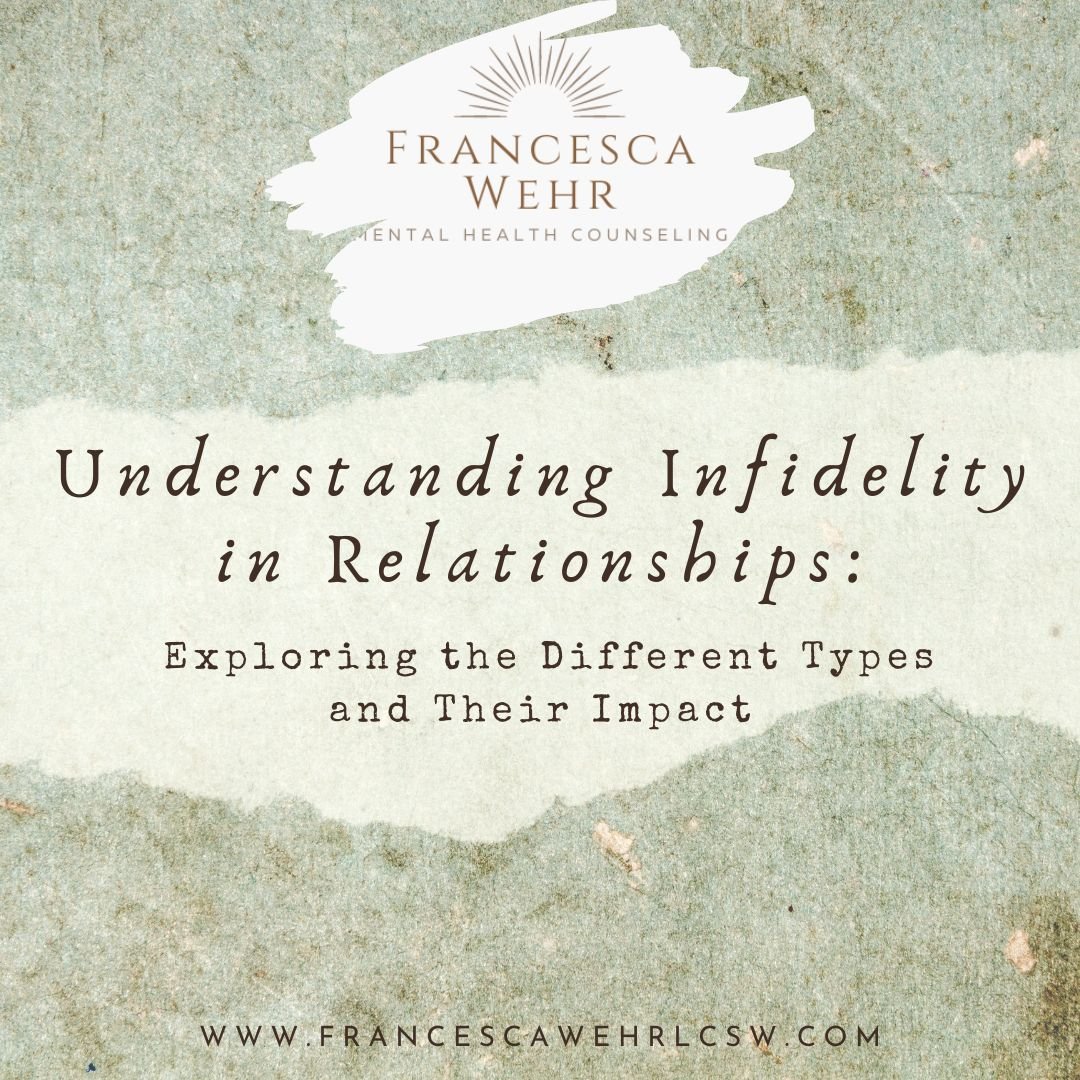
Understanding Infidelity in Relationships: Exploring the Different Types and Their Impact
Infidelity, or the act of being unfaithful in a committed relationship, is a complex and emotionally charged issue. It can manifest in various forms, each with its unique challenges and consequences. Pathways to Wellness: Insights from Francesca Wehr, LCSW Mental Health Counseling explores the different types of infidelity – physical, emotional, cyber, object, and financial – and provides examples of each to help deepen our understanding of this sensitive topic.
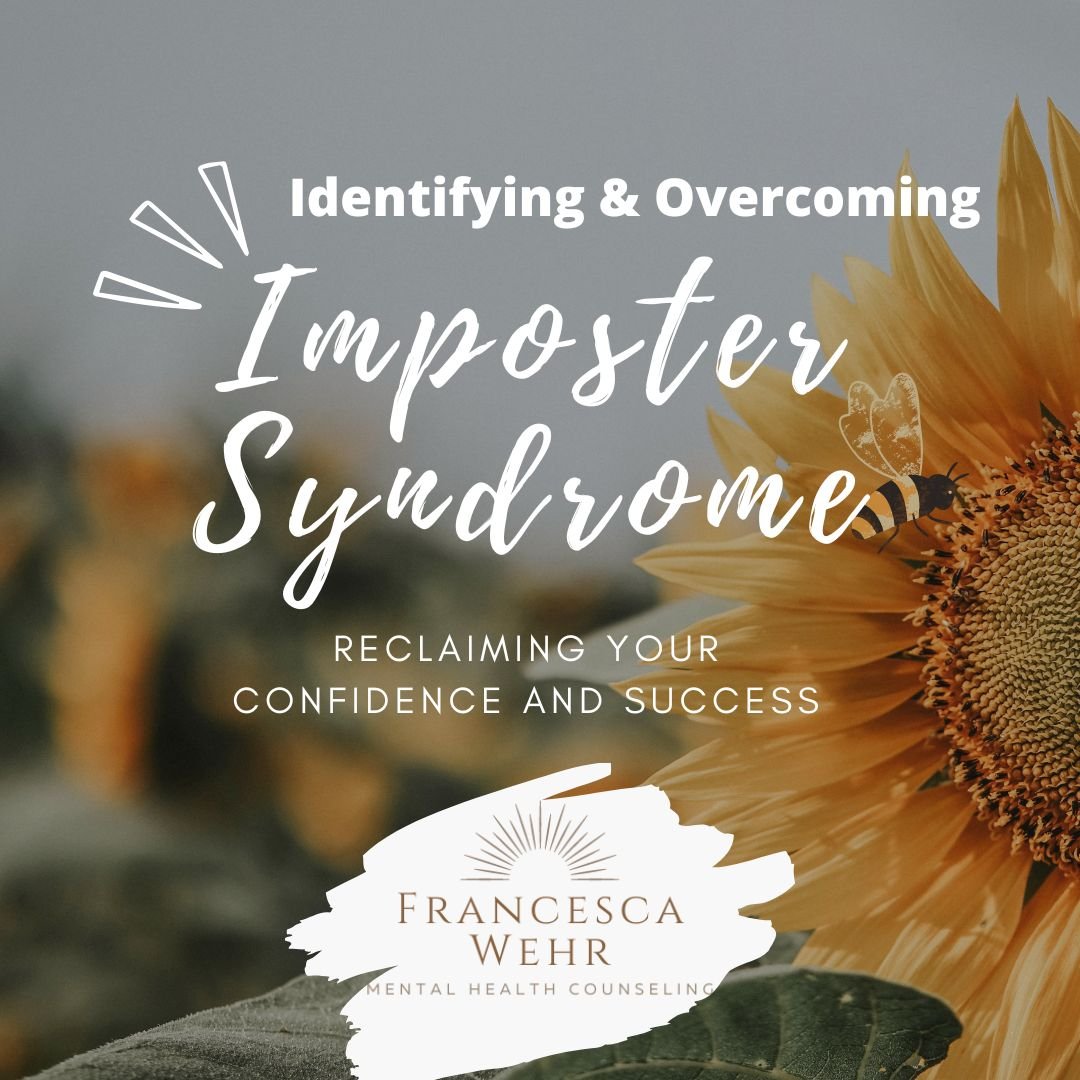
Identifying and Overcoming Imposter Syndrome: Reclaiming Your Confidence and Success
Imposter Syndrome is a psychological phenomenon where individuals doubt their accomplishments and fear being exposed as a "fraud." Despite evidence of their success, those with Imposter Syndrome struggle to internalize their achievements and often attribute them to luck or external factors. Pathways to Wellness: Insights from Francesca Wehr, LCSW Mental Health Counseling discusses how to identify Imposter Syndrome and provides practical tips for overcoming this self-limiting mindset.
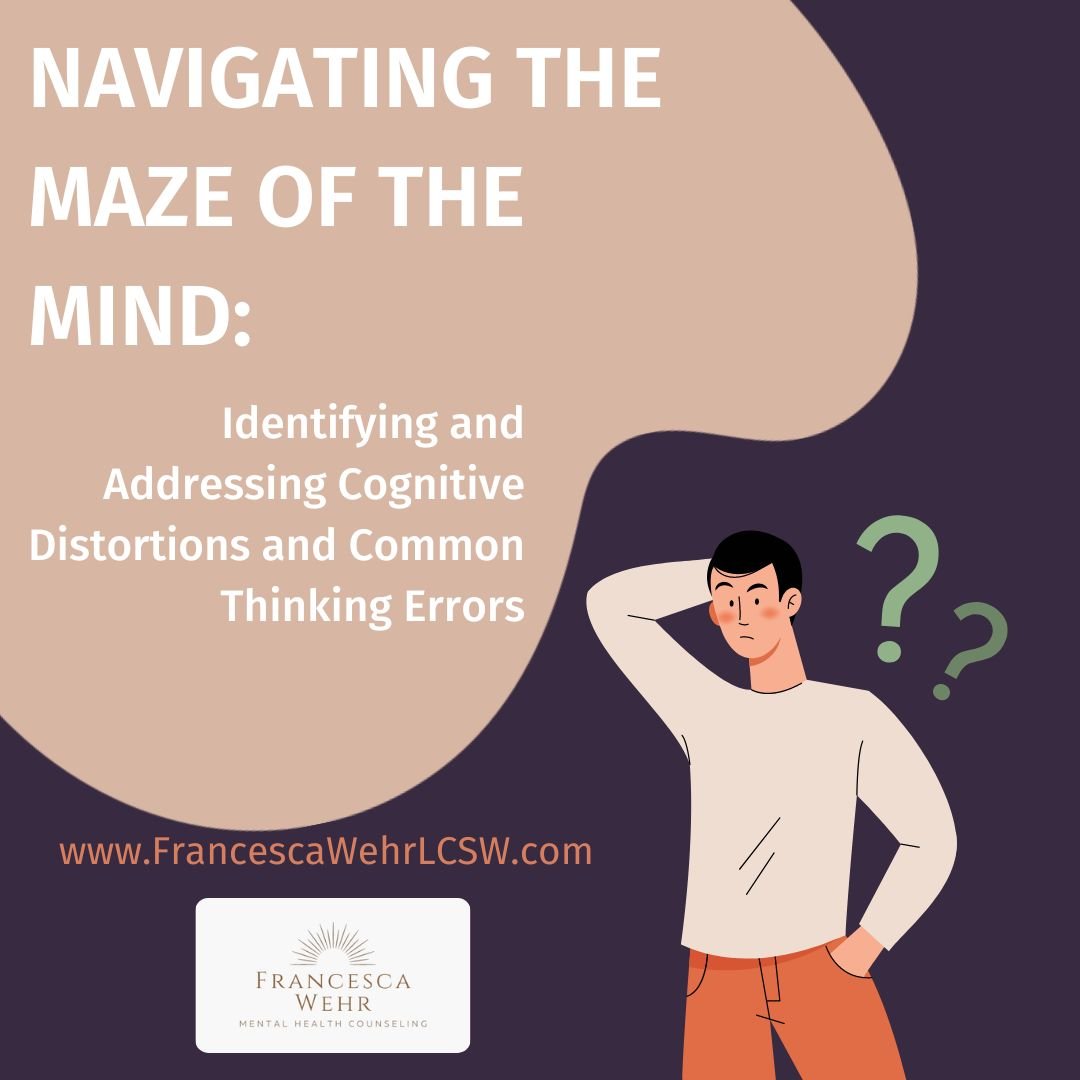
Navigating the Maze of the Mind: Identifying and Addressing Cognitive Distortions and Common Thinking Errors
Cognitive distortions are common thinking errors that can negatively impact mental health, leading to anxiety, depression, and low self-esteem. In this blog, we explore the most common cognitive distortions, such as all-or-nothing thinking and emotional reasoning, and provide actionable strategies to challenge and reframe these thoughts. By recognizing and addressing these distortions, you can develop healthier thought patterns and improve your emotional well-being.
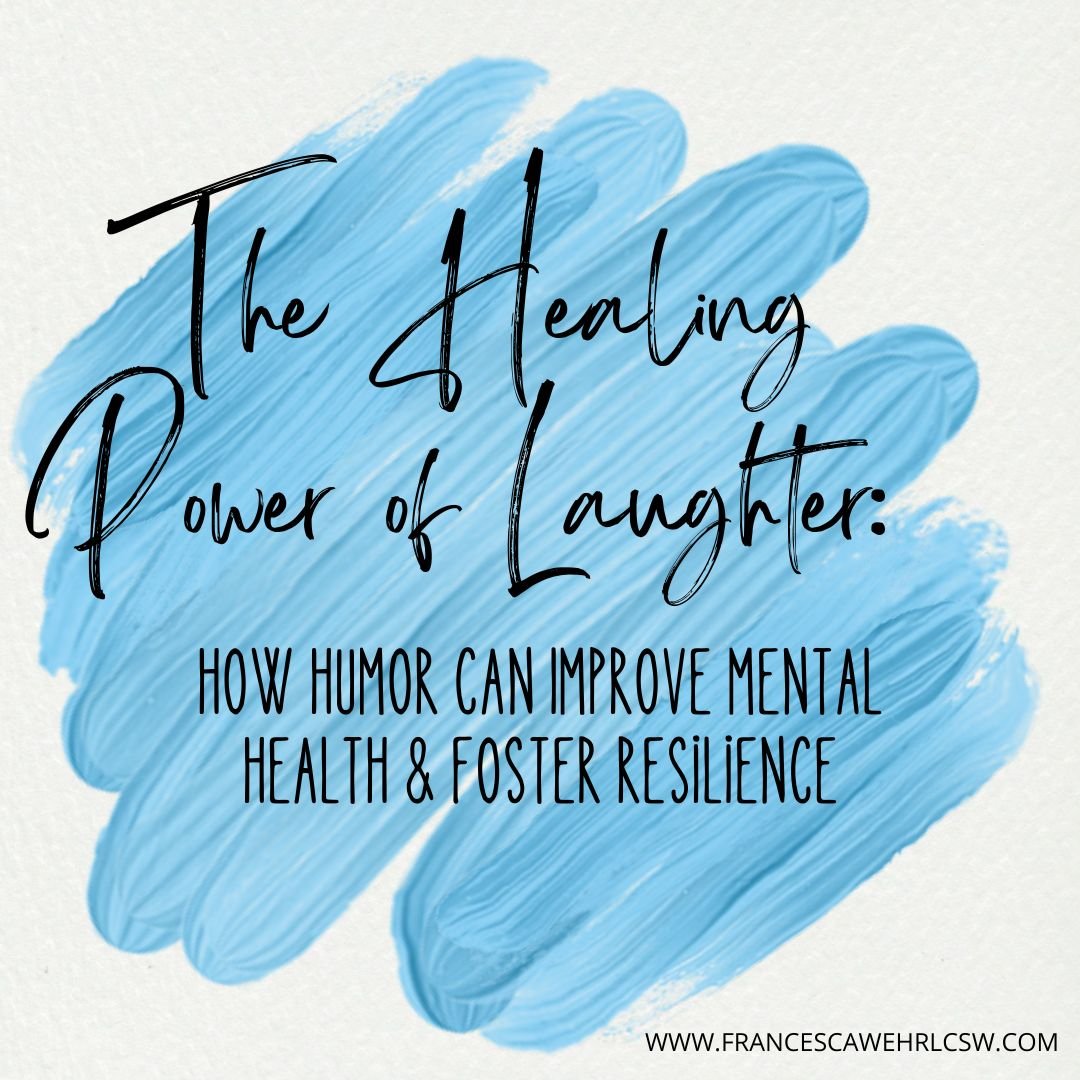
The Healing Power of Laughter: How Humor Can Improve Mental Health and Foster Resilience
Laughter is a universal language that transcends cultural barriers and can provide a much-needed respite from life's challenges. Francesca Wehr, LCSW Mental Health Counseling investigates the psychological benefits of laughter and humor, offering tips for incorporating more lightheartedness into daily life and using humor as a coping mechanism.




